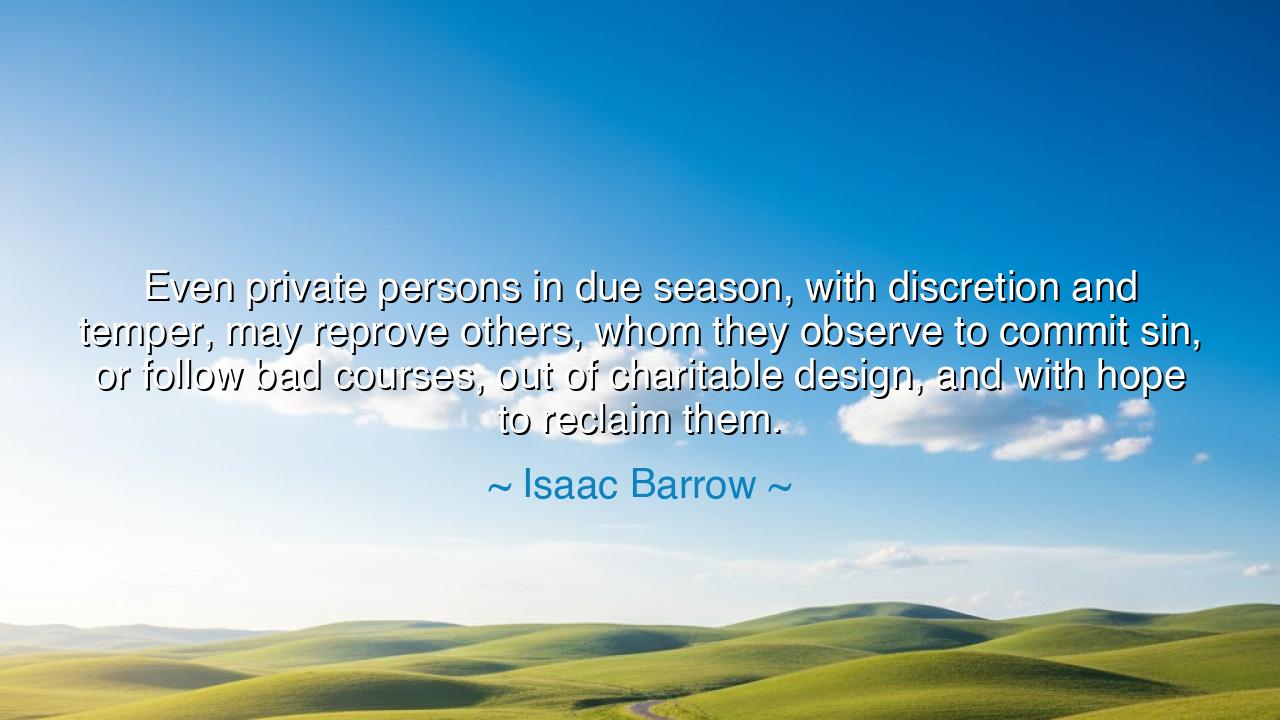
Even private persons in due season, with discretion and temper
Even private persons in due season, with discretion and temper, may reprove others, whom they observe to commit sin, or follow bad courses, out of charitable design, and with hope to reclaim them.






The words of Isaac Barrow — “Even private persons in due season, with discretion and temper, may reprove others, whom they observe to commit sin, or follow bad courses, out of charitable design, and with hope to reclaim them.” — breathe the ancient spirit of moral courage and compassion. In these lines, Barrow, the great theologian and preacher of the seventeenth century, teaches that correction, when born of love and guided by wisdom, is not arrogance but charity in action. He reminds us that one need not be a priest, king, or philosopher to stand for what is right — that even the humblest among us bears the sacred duty to guide a brother or sister away from darkness, not to condemn, but to redeem.
In the age of Barrow, England wrestled with the turmoil of conscience and the weight of moral decay. His words were a call to reclaim virtue not through punishment, but through the quiet power of gentle correction. Yet his teaching is far older than his time. It echoes the wisdom of the ancients — the Stoics who taught that to admonish a friend with patience was a mark of true friendship, and the early Christians who believed that love without truth becomes indulgence, while truth without love becomes cruelty. Barrow’s insight pierces to the heart of that balance: to reprove with discretion and temper, that the flame of virtue might be rekindled rather than extinguished by wrath.
To understand this, consider the example of Socrates, who walked the streets of Athens questioning, challenging, and guiding. His corrections were not born of pride, but of love for the soul and devotion to truth. When he reproved others for their ignorance, he did so not to humiliate them, but to awaken them — to bring them from the sleep of error into the light of understanding. Like Socrates, Barrow saw that moral correction is a form of compassion, an act of intellectual and spiritual midwifery, through which one soul helps another to be reborn into virtue.
Yet, how often do people today — and in all ages — confuse judgment with guidance? Many speak harshly under the guise of righteousness, condemning not to heal but to harm. Barrow warns against this folly. He counsels that correction must come only “in due season, with discretion and temper” — meaning that timing, gentleness, and humility are as vital as the message itself. One who reproves in anger plants bitterness; one who corrects in patience plants wisdom. The ancients likened such wisdom to tending a wounded tree: prune too roughly and it dies; prune with care and it grows straight again.
The Scriptures tell us that even the prophets, though stern in word, wept in private for the sins of those they rebuked. True reproof is not born of superiority, but of sorrow for another’s fall and hope for their renewal. This is the “charitable design” of which Barrow speaks — the desire not to triumph over another’s guilt, but to restore them to dignity. Such correction demands courage, for it risks rejection; and it demands compassion, for it seeks not victory but redemption. Only those who love deeply can correct rightly, for only love can see another’s weakness and still choose mercy.
History gives us a noble example in Abraham Lincoln, who during the bitterness of civil war reproved not with vengeance but with magnanimity. His rebukes were wrapped in grace, his justice softened by mercy. When asked how he would treat his enemies, he replied, “Do I not destroy my enemies when I make them my friends?” That is the spirit of Barrow’s teaching — correction that heals rather than wounds, that lifts rather than shames. Lincoln understood that the goal of moral correction is not to punish evil, but to transform it into good through understanding and forgiveness.
Thus, the lesson is clear and enduring: if you must reprove another, do so as a healer, not a judge. Speak only when your heart is free from pride and filled with goodwill. Let your words be measured, your tone gentle, your intention pure. For the power to correct is a sacred trust, not a weapon. To use it rightly is to participate in the divine work of restoration — to turn the erring back toward the light. As Barrow reminds us, hope must always guide correction, for without hope, reproof becomes cruelty. Therefore, let your voice, when raised against wrongdoing, be the voice of love — steady, patient, and unwavering — that others may find in it not condemnation, but the first whisper of redemption.






AAdministratorAdministrator
Welcome, honored guests. Please leave a comment, we will respond soon